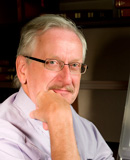
Distinguished Mentor Award
After years of effort, why would a doctoral student deliberately choose a lab that typically requires an additional year of dissertation work? The answer is Rick Moran, recognized both through this award and by his students as a Distinguished Mentor.
“The reason for the extra year (and the popularity of his lab) is that Rick gives his students an extra degree of freedom in designing and executing their projects….they learn more and are more creative when more is expected of them,” explained Vice Chair, Pharmacology and Toxicology, Stephen T. Sawyer, Ph.D. “He makes sure that his students are making the best of their experience as graduate students,” agreed a former mentee.
“He never spoon feeds anyone; he will let you wander and find the answers,” added another former post-doc in the Moran lab. “Now I have my own lab and in times of crunch I still think ‘what would Rick do?’ He just does not feed the fish, but teaches them to swim and
survive.”
“In Greek mythology, ‘Mentor’ was the advisor of Odysseus who was entrusted with instructing and guiding Odysseus’ son Telemachus in his absence during the Trojan War. I think this defi nition is apt because Professor Moran was, first and foremost, concerned with the individual development of his students and postdoctoral associations,” explained John L. Andreassi, II, Ph.D. “He effectively guided us through every stage of our graduate training. He indoctrinated his students with a solid foundation of proper experimental design and encouraged us to explore our own ideas both in theory and at the bench.”
“Dr. Moran also felt strongly that his students must develop their thought processes in addition to their hands on abilities,” said former doctoral advisee Fiona Turner. “We were encouraged to present at local, national and international meetings and he was instrumental in the manuscript writing process, offering valuable criticism and insight.” “His critiques focused and strengthened my grant application, which no doubt aided it in being funded,”
added William A. Barton, Ph.D., Associate Professor, Biochemistry and Molecular Biology.
“Rick is one of the finest mentors of graduate students that I have ever met,” said Michael F. Miles, M.D., Ph.D., Professor, Pharmacology/Toxicology and Neurology. “He demands technical excellence and creativity from his students. More importantly, he demands (and teaches) an intense intellectual curiosity and honesty from each of his students.”
“I continue to benefit from Rick’s mentorship and guidance well beyond my Ph.D. candidacy,” wrote a former mentee who now is with Sloan-Kettering. “I turn to him whenever I put in a grant application or have a career development question since I know he will always be a source of valuable advice.”
“The success of graduates of the department or any one laboratory is the best measure of the quality of the mentoring,” states William L. Dewey, Ph.D., Professor and Interim Chair, Pharmacology and Toxicology. “There has been a long line of very successful graduates from Rick’s laboratory. He continues to be a real asset to this school and, through his mentoring he will continue to bring signifi cant prestige to the whole institution.”

